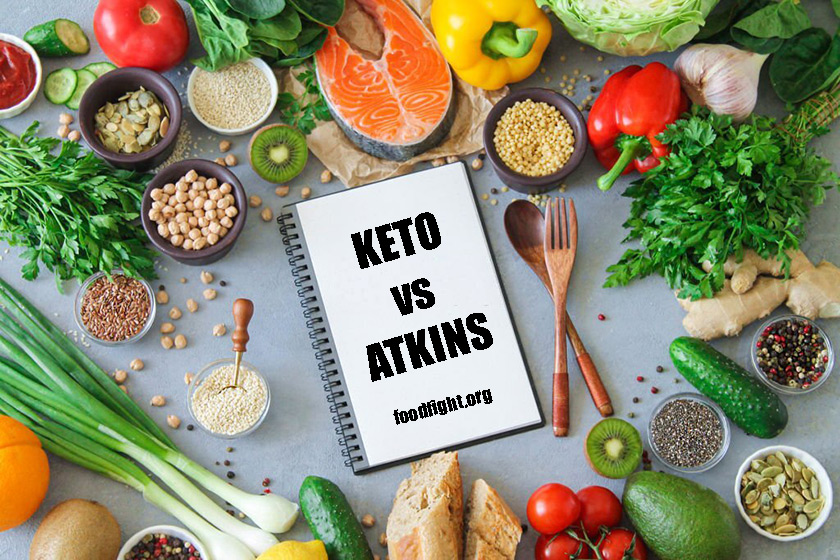Considering a lifestyle shift to enhance your well-being? You've likely come across the names ‘Keto diet' and ‘Atkins diet'.
These time-tested, popular dietary approaches are renowned for their weight loss benefits.
In this piece, we'll delve into a comprehensive comparison of these two diets, examining their macro breakdowns, meal plans, benefits, potential risks, and cost implications.
We'll also help you discern which one might be the perfect fit for you. So, if you're pondering over the keto vs Atkins conundrum, stay with us to unravel the answer!
Key Takeaways
- Both Keto and Atkins diets involve reducing carb intake and emphasizing healthy fats and proteins.
- Keto is more restrictive, with a focus on entering ketosis through very low carb intake, while Atkins gradually increases carb intake over time.
- Each dietary approach carries potential health benefits, encompassing weight loss and enhanced blood sugar regulation, but they may pose challenges for long-term adherence.
- Your personal preferences and objectives should steer your decision between these two diets. However, it's always beneficial to seek advice from a nutritionist or dietitian to bolster your chances of success.
Overview of Keto Diet
The keto diet is a high-fat, low-carb way of eating that's become popular for its potential health benefits – so you can start reaping the rewards right away!
Primarily, it involves reducing your carb intake and replacing it with healthy fats.
This forces the body to enter a state of ketosis where it burns fat instead of carbs for energy.
Additionally, some people on the keto diet also practice intermittent fasting, which involves periods throughout the day when food is not allowed.
Many also use sugar substitutes like stevia or monk fruit sweetener to replace sugary foods in their diets.
By embracing a balanced keto diet plan, brimming with nutrient-rich foods, you can unlock a treasure trove of potential health benefits.
These might encompass shedding those extra pounds, enhancing control over your blood sugar and cholesterol levels, and even boosting your energy levels.
Moreover, thanks to its emphasis on whole foods and natural fats like olive oil and avocado, the keto diet is a powerhouse of essential vitamins and minerals, contributing to your overall well-being.
However, remember, we're all unique, and our bodies react differently to various diets. So, it's always a smart move to have a chat with your doctor before you embark on this or any new dietary journey!
With proper guidance from your healthcare provider though, transitioning into this lifestyle change may help you reach your goals safely while enjoying all its associated benefits along the way.
With that being said, let's take a look at the Atkins Diet – another popular method for achieving optimal health management through nutrition.
Overview of Atkins Diet
Experience the power of Atkins – a low-carb nutrition plan with plenty of variety that'll have you feeling amazing.
With the Atkins diet, you can enjoy an array of food choices, all while making a lifestyle change to improve your health.
Eliminate unhealthy carbs and sugar to reduce hunger cravings and lose weight.
Increase consumption of healthy fats for satiety and improved energy levels.
Enjoy lean proteins such as eggs, poultry, fish, and seafood to support muscle maintenance and recovery from exercise.
Incorporate fiber-rich vegetables like kale, spinach, broccoli, Brussels sprouts, etc., creating a well-rounded eating pattern for general wellbeing and optimal health outcomes.
Atkins encourages flexibility with dietary choices by allowing individuals to customize their plans based on their lifestyles and needs – whether that means focusing on meal planning or counting macros throughout the day; each approach is valid in achieving one's desired goals!
As you make progress with Atkins, you'll find yourself having more energy throughout the day while still being able to enjoy meals out or at home without compromising your progress – setting yourself up for success along your journey towards better health!
Transitioning into learning about macros and meal plans will provide further understanding of how this diet works in practice!
Macros and Meal Plans
Gaining an understanding of macros and meal plans can help you tailor your Atkins nutrition plan to fit your individual lifestyle.
A well-rounded Atkins diet focuses on portion sizes, macronutrients, and energy balance.
The types of food eaten during the four phases of the Atkins diet are detailed below in a table:
| Phase | Foods Permitted | Foods Not Permitted |
|---|---|---|
| 1 | Fatty meats, fish, eggs, vegetables (non-starchy), nuts & seeds | Sweets, breads, grains, pasta, processed foods with added sugar or flour |
| 2 | As above plus some whole grains and starchy vegetables | Fruit & fruit juices with added sugar |
| 3 | As above plus more fruits & whole grain products | Refined carbohydrates such as pastries, snacks & desserts |
| 4 | All food groups allowed in moderation | None – focus on nutrient dense meals with limited refined carbs |
Keeping track of macronutrient intake is essential for success on the Atkins diet.
Macronutrients include proteins (such as lean meats), fats (like olive oil) and carbohydrates (including leafy greens). It's important to adjust your macronutrient ratios based on which phase you're in.
During Phase 1 of the Atkins diet you should aim for 60% fat intake; 25-30% protein; 15% carbohydrate. This ratio changes slightly in subsequent phases as more complex carbohydrates are reincorporated into the diet.
The goal is to reach a state of energy balance while still feeling satisfied after eating balanced meals so that it becomes a habit that sticks over time.
Meal planning is key for success while following any type of eating pattern but especially when it comes to low-carb diets like Atkins where there are stricter guidelines around what types of foods can be eaten during each phase.
Benefits and Risks
Discover the potential health benefits and risks of an Atkins lifestyle to make an informed decision about your nutrition.
An Atkins diet is a low-carbohydrate eating plan that has been around for decades, but recently surged in popularity.
The idea behind this diet is that limiting carbohydrates can help the body burn fat more efficiently, resulting in weight loss.
At its core, it allows you to eat fewer calories without feeling hungry all the time by restricting certain food groups.
While there are many potential benefits to implementing an Atkins lifestyle, there are also some important considerations when evaluating its impact on overall health.
Exercise impact plays a crucial role in any healthy lifestyle, and this remains true with an Atkins diet as well.
Limiting your carbohydrate intake may result in improved mental clarity and increased energy levels due to ketosis; however, these effects will be diminished if adequate exercise is not included as part of the daily routine.
Additionally, research has indicated that while following a low-carbohydrate diet significantly improves weight loss results initially, long-term adherence often leads to plateauing or even regaining lost weight without proper exercise habits in place.
The potential benefits of an Atkins lifestyle include reduced hunger cravings due to satiety from protein sources and improved mental clarity when ketones become elevated after several days on the program.
However, these boosts you're seeing might pack up and leave as fast as they came if you don't invite some buddies along for the ride. We're talking about getting your body moving regularly and really thinking about what you're feeding it. These two make a world of difference!
Evaluating how this plan could affect you personally should take into account both the short-term gains such as initial weight loss and longer-term outcomes like maintaining a healthy body composition over time with balanced meals and regular exercise sessions.
To get a better sense of how much implementing an Atkins style of eating might cost financially compared with other diets…
Cost Comparison
Assessing the cost of the Atkins lifestyle in comparison to other diets can feel like weighing up apples against oranges, yet it's valuable to examine both perspectives.
The Keto Diet, with its focus on high-fat foods like avocados, olive oil, and nuts, often carries the reputation of being one of the more expensive dietary approaches.
However, numerous individuals have discovered that this diet can actually be a money-saver in the long haul, as they find themselves spending less on processed snacks and meals.
Conversely, the Atkins Diet, with its emphasis on low-carbohydrate staples such as eggs, meat, cheese, and vegetables, is generally considered to be a more budget-friendly option.
To get started on either diet without breaking your budget, consider making some simple shopping tips such as planning out meals ahead of time and using coupons to save money when buying groceries or ordering takeout.
Additionally, seeking out advice from a qualified nutritionist or dietitian can help ensure you're getting all the necessary dietary components while staying within your budget.
When comparing meal plans between Keto and Atkins lifestyles, it's important to note that each plan has its own unique set of macronutrients that need to be taken into account.
For example, while both diets focus on reducing carbohydrate intake they differ in terms of protein sources – with Keto being more plant-based and Atkins relying heavily on animal proteins like beef or chicken.
It's also worth noting that some items may be allowed under one plan but not another; for instance, avocados are acceptable under Keto but not included in an Atkins plan.
Ultimately, it comes down to finding what works best for you based on your goals (weight loss/maintenance) and budget constraints – both diets offer benefits if done correctly, so do your research before committing to either lifestyle!
Transitioning into the next section about the ‘comparison of meal plans,' let's explore how each diet stacks up nutritionally.
Comparison of Meal Plans
Deciding between different meal plans can be overwhelming, so let's compare the nutritional benefits of two popular lifestyles: Keto and Atkins.
Both diets are focused on low-carb eating as a way to lose weight, but they have some key differences that could help you decide which is right for you.
Although both diets limit carbohydrates, the Keto diet limits carbs more drastically than the Atkins diet. The primary difference lies in their approaches to food choices and exercise benefits.
The Keto diet encourages high fat intake and moderate protein consumption while limiting carbs to only about 5-10% of total calories consumed per day.
On this regimen, your body enters a state of ketosis where it begins burning fat instead of glucose for energy. This effectively cuts down on cravings and hunger pangs while providing enough nutrients for your body to function properly.
Exercise is not required, but recommended for better health outcomes since physical activity helps boost metabolism and keep muscles toned.
Atkins focuses on a carb controlled approach that gradually increases carb intake over time as long as weight loss continues steadily.
Unlike the Keto diet, Atkins offers more flexibility with food choices by allowing higher levels of carbs along with adequate amounts of fats and proteins throughout the day.
Exercise benefits are also encouraged because physical activity helps regulate insulin levels that can affect weight gain/loss in relation to carbohydrate ingestion patterns associated with this lifestyle plan.
Both diets offer potential health advantages when done correctly; however, it's important to determine which one works best for you based on personal preferences and goals regarding nutrition or fitness related objectives long-term before committing wholeheartedly into either one without proper guidance from an expert like a physician or registered dietitian nutritionist (RDN). Which is right for you?
Which is Right for You?
Finding a lifestyle plan that clicks with you is key, especially when you consider that research tells us about 70% of diets end up being short-lived.
When you're weighing up the keto diet against Atkins, there are certain differences that might make one a better fit for you than the other.
If you're thinking about shaking up your eating habits, it's really important to get a handle on how each of these plans works and what they can offer you in terms of meals and snacks.
The main thing that sets keto and Atkins apart is how they deal with carbs.
With the keto diet, it's all about high-fat, low-carb eating, with most of your carbs coming from non-starchy veggies.
On the other hand, Atkins is a bit more relaxed, letting you have more complex carbs like whole grains and legumes, but in moderation.
Each plan has its own set of foodie rules, so make sure you read them carefully before you decide which one is the right fit for you.
Eating out can be a bit tricky when you're following either of these plans, but don't worry, with a bit of homework beforehand, you'll find there are still plenty of options out there for you.
Snack-wise, both offer similar options such as nuts, seeds, and nut butter, but keto also allows dairy products like cheese, which may not be an option with Atkins due to its higher carbohydrate content.
Ultimately, it all depends on individual preferences when choosing between the keto diet vs Atkins, so take time to explore each option thoroughly before committing yourself to ensure success down the line.
Frequently Asked Questions
What are the long-term health effects of following a keto or Atkins diet?
When it comes to the enduring health effects of dieting, there are several factors to ponder.
First off, the art of dining out and meal planning can significantly influence any dietary plan. Both the Keto and Atkins diets necessitate meticulous meal planning that incorporates balanced meals with wholesome ingredients.
Secondly, research hints that these diets may offer short-term weight loss benefits. However, the jury is still out on their long-term effectiveness or safety.
Lastly, when contemplating any long-term dietary shift, it's crucial to ensure it's a good fit for your lifestyle. An excessively restrictive diet may not be feasible in the long haul, so it's important to find a dietary plan that you can comfortably adhere to over time.
Are there any tips for making the transition to a keto or Atkins diet easier?
Making the transition to a healthy diet can be challenging, but there are some useful tips that can make it easier.
Firstly, when eating out, look for restaurants that offer keto or Atkins friendly options.
Secondly, try meal planning in advance so you have a better idea of what food will be available and create a grocery list accordingly.
Also, take small steps by gradually introducing new foods and removing unhealthy ones from your diet over time.
Lastly, stay motivated by setting realistic goals and tracking your progress. This will help keep you on track with your new diet plan.
Are there any recipes specifically designed for the keto or Atkins diets?
You may be wondering if there are any recipes specifically designed for the keto or Atkins diets. The answer is yes!
You can find many cooking methods and meal plans based on these diets online.
For example, some of the most popular recipes include low-carb pizza, high-fat smoothies and avocado toast.
However, it's important to remember that while a ketogenic diet and an Atkins diet may have similarities in their approach to nutrition, they also have some differences.
That means it's important to research which diet is right for you before committing to any specific recipe or meal plan.
With the right combination of cooking methods and meal plans, you can make the transition to either of these diets easier and more enjoyable.
What are the recommended amounts of exercise when following a keto or Atkins diet?
When it comes to exercise, there's no one-size-fits-all answer. It really depends on your goals and overall health status.
Generally speaking, the American College of Sports Medicine recommends 150 minutes of moderate physical activity per week for adults, which can be broken down into 30 minutes a day or five days a week.
However, when following a keto or Atkins diet, meal planning and snack choices should be taken into account as well since both diets involve restricting carbohydrates.
For instance, exercising before breakfast may increase your risk of hypoglycemia if you're already in a state of ketosis due to carb restriction.
Therefore, it's important to adjust your workout routine according to your meal plan and snack choices while following either of these diets.
Are there any supplements recommended for a keto or Atkins diet?
You might be familiar with the phrase ‘you are what you eat', and it's spot on – the nourishment you provide your body can greatly impact your overall well-being.
When thinking about supplementing a keto or Atkins diet, it's key to assess your dietary choices and meal planning to figure out if you need to add any extra nutrients.
Your individual needs might dictate that certain dietary supplements could be beneficial while you're following either of these diets.
For instance, omega-3 fatty acids, which are crucial for optimal brain function and combating inflammation, can be obtained from supplements like fish oil capsules and flaxseed oil.
Moreover, vitamin D, magnesium, and calcium might also prove to be helpful during specific phases of the diet.
Ultimately, having a chat with a healthcare professional about supplementing with vitamins or minerals could be a wise move, depending on your distinct dietary needs.
Conclusion
You've done your research and now it's time to make a decision. You've weighed the benefits and risks, looked at the cost comparison, and compared meal plans.
When it comes down to it, you have to decide which diet is best for you.
Keto and Atkins both offer advantages, but ultimately you need to choose what works best with your lifestyle.
The use of metaphors can help bring clarity to this tough decision: if Atkins is a marathon runner who goes the distance, then Keto is a sprinter that gets results quickly.
So which one will you pick?
Pick wisely; your health depends on it!






